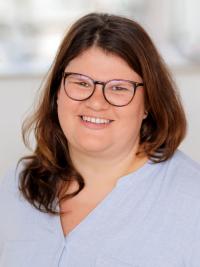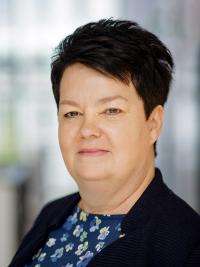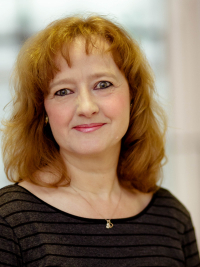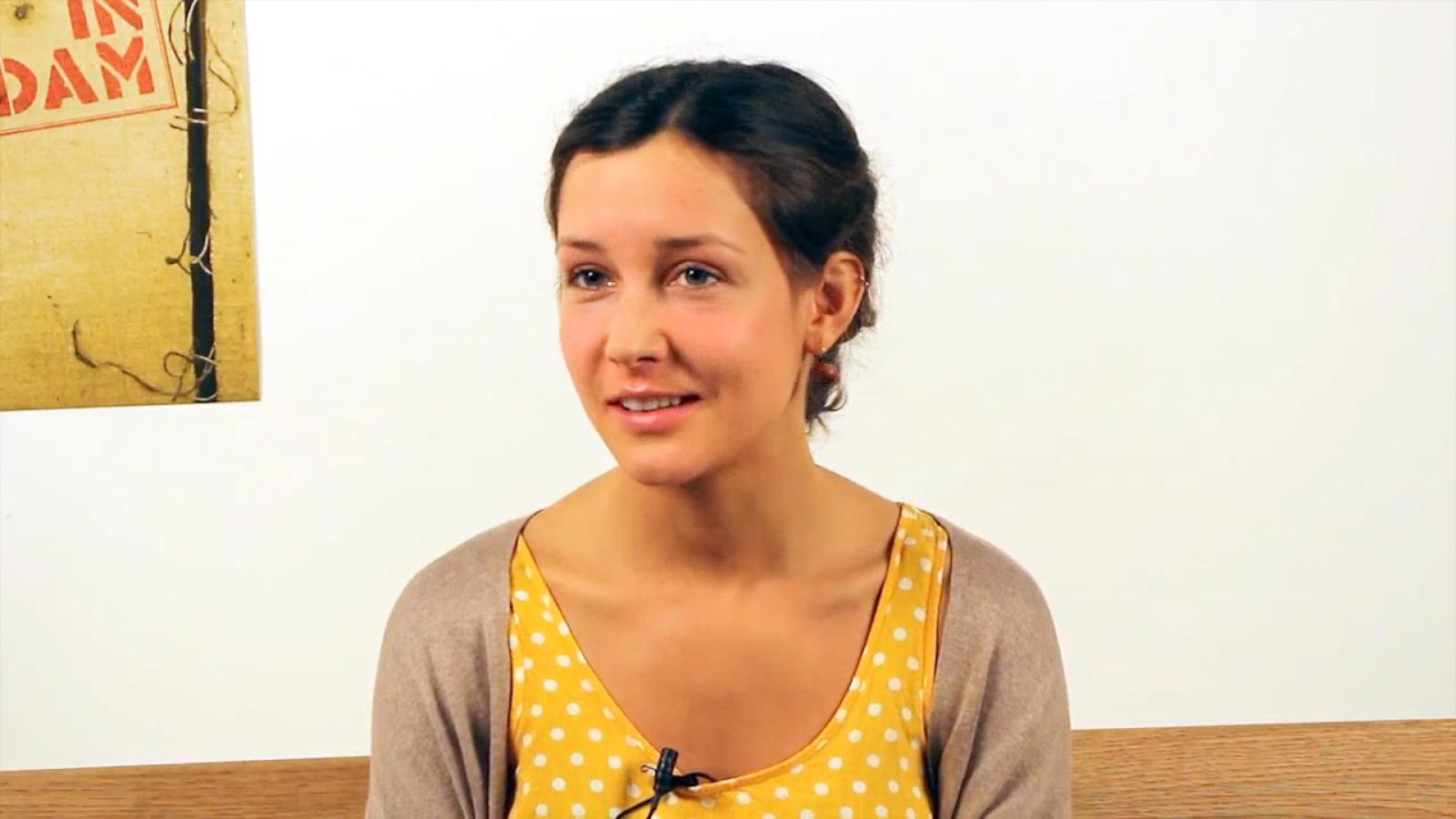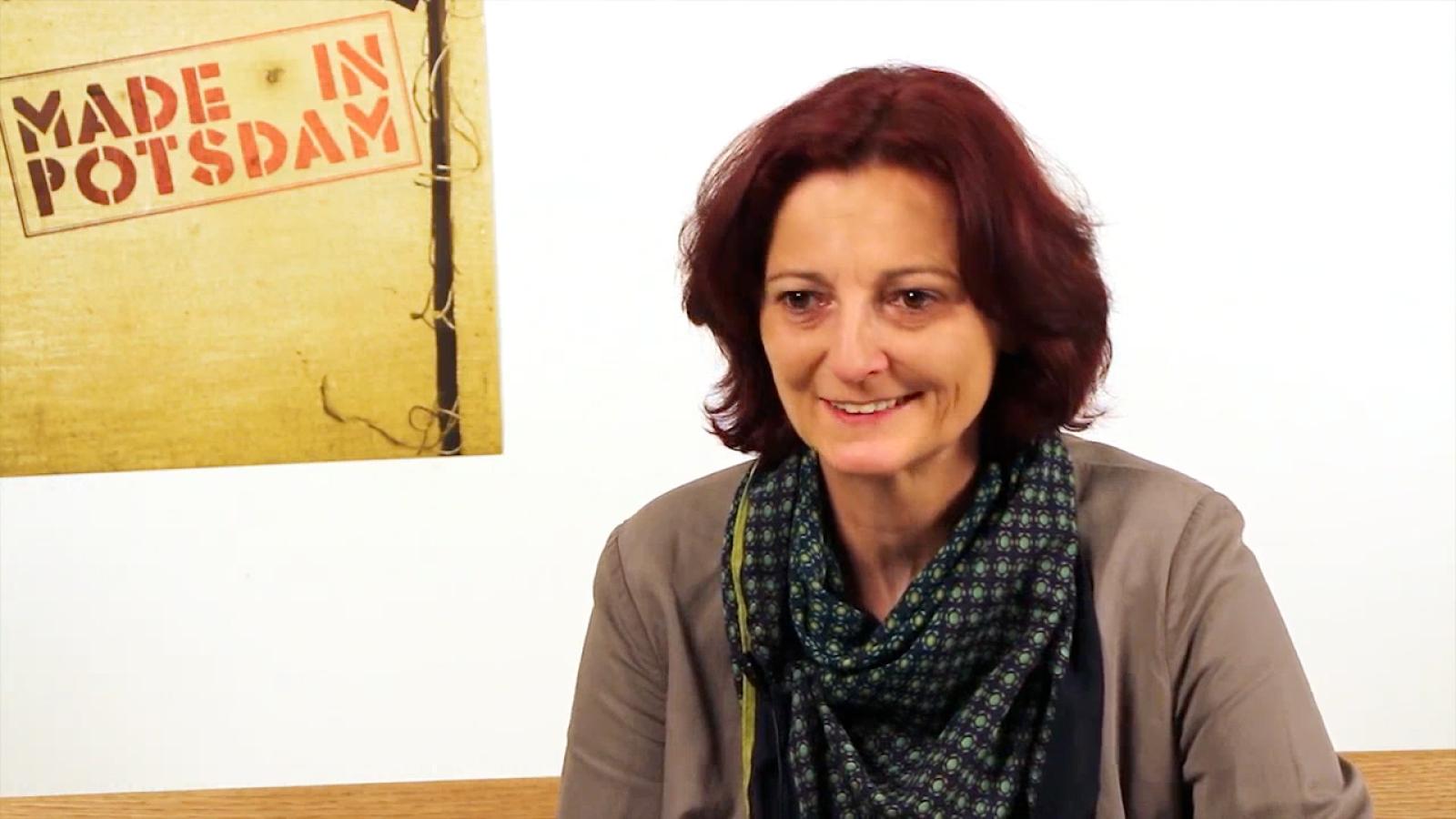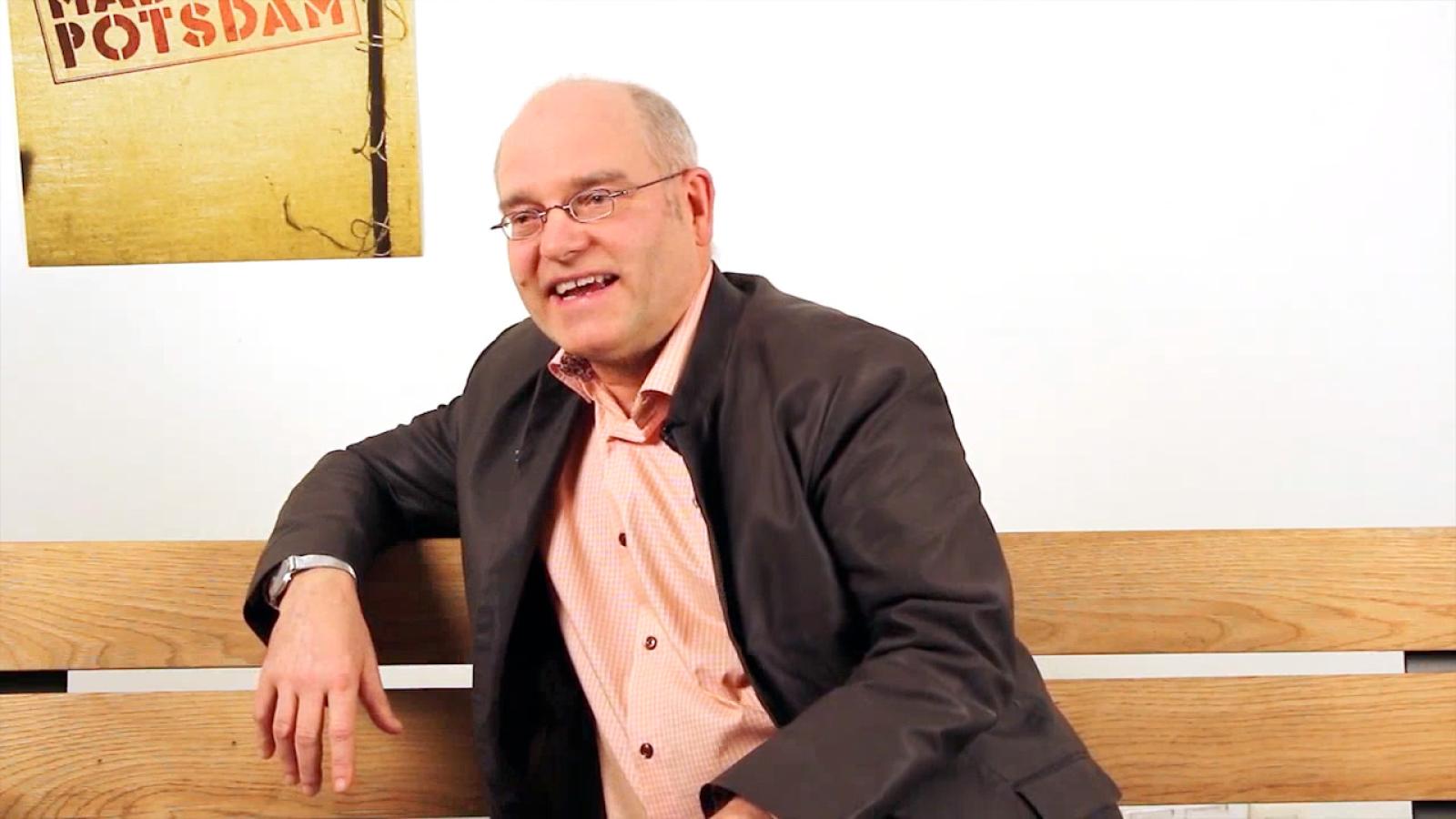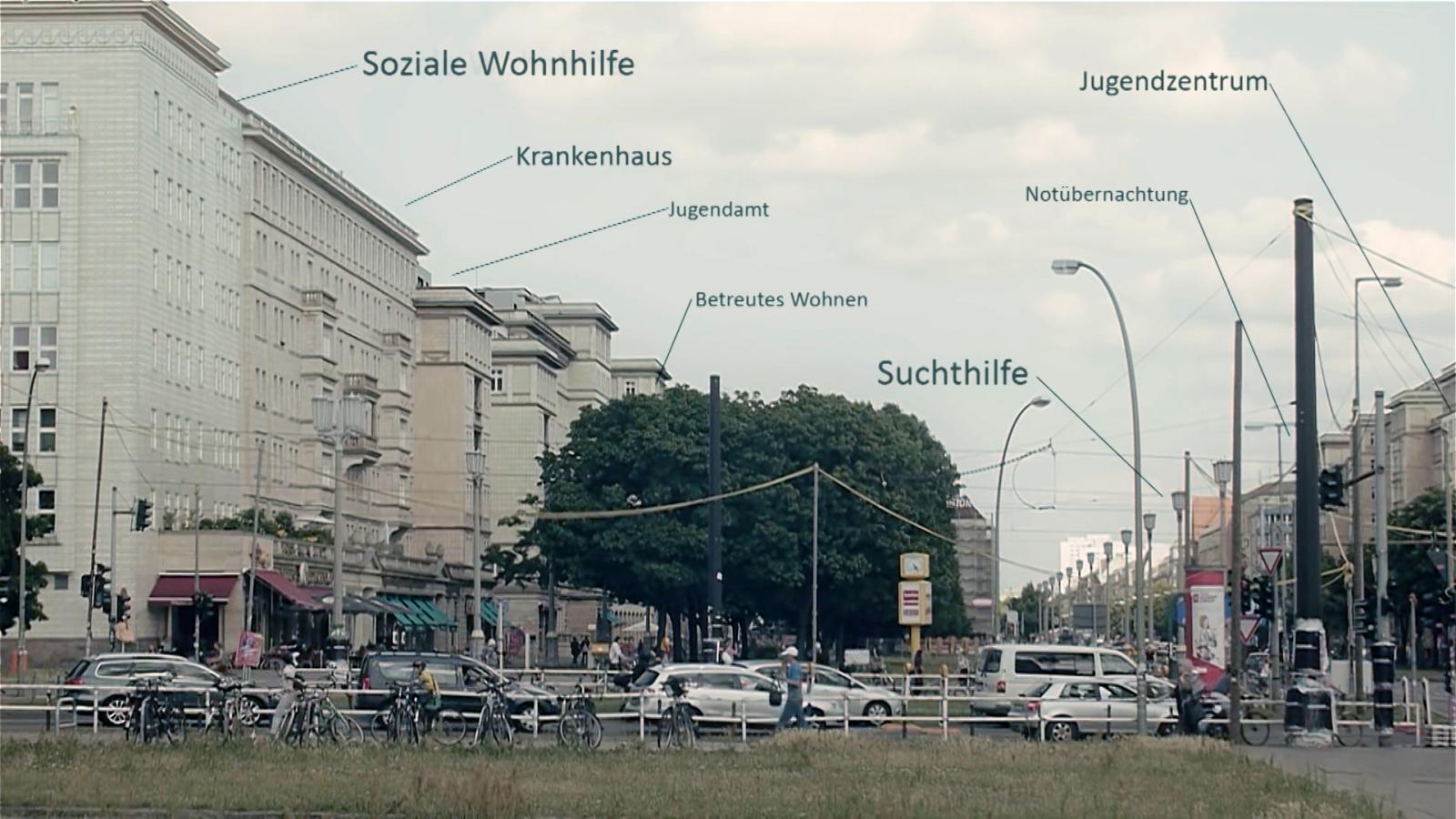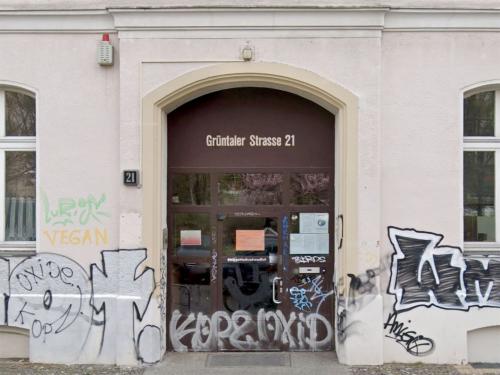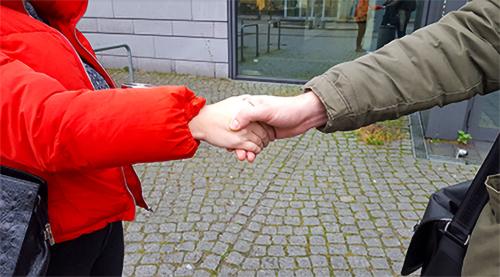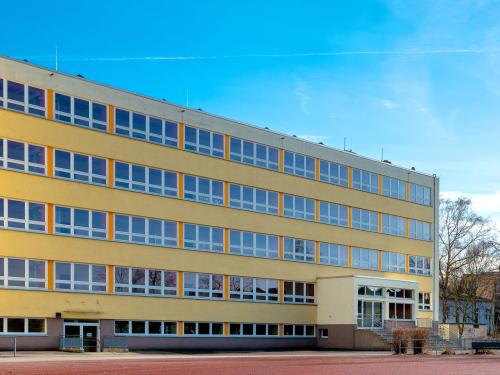The bachelor's degree programme in social work at the University of Applied Sciences Potsdam offers a very broad, academically sound and at the same time practice-oriented education, with which you can work in all areas of social work after graduation. During your studies, you can set and pursue your own focal points. In the integrated internship, the theoretical knowledge acquired is applied and reflected upon.
Profile
Passt dieser Studiengang zu mir?
Sozialarbeitende bringen eine Vielfalt von Perspektiven und Lösungen in die Probleme, mit denen Menschen, Stadtteile, Organisationen konfrontiert sind, wenn simplifizierte Schwarz-Weiß-Urteile oder hochspezialisierte Professionen nicht (mehr) helfen können und eine komplexe Nuancierung menschlicher Erfahrung und Erkenntnis gefragt ist. „Screaming color“ drückt die transformative Kraft Sozialer Arbeit aus, durch ihren Einsatz für marginalisierte Gruppen monochrome Weltsichten zur verändern.
Dazu bietet Ihnen unser Bachelorstudiengang ein hochinteressantes Fachspektrum, wissenschaftliche Fundierung, praktische Erfahrungen. Mit unserer staatlichen Anerkennung können Sie in 100 Berufsfeldern der Sozialen Arbeit professionell wirken. Im Studium setzen Sie individuelle Schwerpunkte, die zu Ihren Interessen und Talenten passen, die Sie herausfordern und weiterbringen. In den Praxisphasen wenden Sie Ihr Wissen in der direkten Arbeit mit Menschen methodisch an. In internationalen Seminaren oder während Ihres optionalen Auslandssemesters erweitern Sie Ihren Horizont. In unseren Reallaboren erforschen Sie mit den Methoden empirischer Wissenschaft die Tiefen und Details sozialer Phänomene.
Soziale Arbeit, für die wir an der Fachhochschule Potsdam stehen, ist intensive Arbeit mit Menschen, Stadteilen und Institutionen: In Beziehung gehen, sich einlassen auf Lebenswelten, Verbindungen schaffen, sich für Gerechtigkeit einsetzen, an der sozialen Zukunft unserer Gesellschaft arbeiten. Kommunikations- sowie Einfühlungsvermögen sind gute Voraussetzungen, genauso wie Konfliktfähigkeit und Durchhaltevermögen. An der Fachhochschule Potsdam betrachten und bearbeiten wir Fragestellungen gleichermaßen aus politischen, psychologischen, medizinischen, juristischen, wirtschaftlichen, soziologischen, praktischen, organisatorischen und ethischen Blickwinkeln. Wir stehen für eine Soziale Arbeit, die konkret hilft, Strukturen erforscht und Zukunft gestaltet.
Social work as a pillar of society
Our society is a complex web of social relationships and processes. Individuals, groups, organisations or entire districts face different challenges and difficulties in the process of coping with life. Social work identifies, examines and addresses the social challenges and problems and develops solutions, arrangements and agreements together with a large number of actors involved.
The focus is always on sensitising society to perceive injustice and disadvantage. With the degree in social work, you gain the qualification to realise and reflect on such help processes and to form communities. In doing so, you will acquire research, preventive, intervening and aftercare working methods. The fields of social work are complex and varied.
Mit dem Studium Soziale Arbeit (B. A.) sind Sie an der Fachhochschule Potsdam richtig …
wenn Sie …
-
für soziale Gerechtigkeit, Partizipation und eine offene Gesellschaft
… stehen
- mit Organisationen, Verwaltung und Recht
… zurechtkommen
- mit Menschen arbeiten und sie in herausfordernden Situationen unterstützen
-
Vielfalt, neue Milieus und andere Kulturen kennenlernen
-
Autonomie und Gestaltungsfreiheit in der täglichen Arbeit
-
eine breit gefächerte Ausbildung und fundiertes Wissen in verschiedensten Bereichen der Sozialen Arbeit erwerben
-
individuelle Schwerpunkte setzen
-
Theorie und Praxis verknüpfen
-
erworbenes Wissen im integrierten Praktikum direkt anwenden
… wollen
Dazu bieten wir ihnen …
- engagierte Profs, moderne Technik, kleine Gruppen, gemeinschaftliche Atmosphäre
- ein interessantes Studium unterschiedlicher Wissenschaften wie Soziologie, Recht, Psychologie, Management, Pädagogik, Politik, Philosophie, Medizin und mehr
- Praktikumsoptionen in 100 Arbeitsfeldern
- Spezialisierungsmöglichkeiten: Jugendhilfe, Konfliktmanagement, Sport, Ästhetik, International Social Work, Forschung
- hochwertige Beschäftigungsmöglichkeiten als studentische Tutor*innen, Scouts, Assistent*innen in Forschungsprojekten
- Flexibles Studieren: Vollzeit, Teilzeit, dual, digital, international
- die staatliche Anerkennung als Sozialarbeiter*in/ Sozialpädagog*in
- Verknüpfungsmöglichkeiten zu Design, Architektur, Kulturarbeit, Zukunftswissenschaft,…
- ein Masterstudium im Anschluss und später die Möglichkeit zur Promotion einem unserer Forschungsprojekte
- einen grünen Campus, mit Casino und Commuity
Online Studienwahl-Assistent (OSA)
In unserem Online-Studienwahl-Assistenten können Sie testen, ob der Studiengang zu Ihnen passt.
Dort finden Sie viele weitere Videos mit Meinungen und Tipps von Studierenden und Dozent*innen und können einen Blick auf typische Studienaufgaben werfen.
Contact
The colleagues at the student counselling service provide information to prospective students, first-year students, parents, teachers and students on all general questions about the degree programme. If you have specific questions or concerns about the bachelor's degree programme in social work, please contact the subject counselling service.
Subject Counselling Service

Dipl.-Soz.Arb. Dipl.-Soz.päd. Matthias Schreckenbach, M. A.
Studiengangsmanagement & Internationales
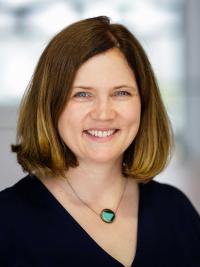
Kati Schröder, B. A.
These degree programmes might also interest you
More courses| Degree programme | Teaching language | Start of study | Application deadline | |
|---|---|---|---|---|
| |
Childhood Studies and Children's Rights (MA) | English | Winter semester | Note: This degree programme will no longer be offered from winter semester 2024/25
|
| |
Early Childhood Education (BA) | German | Winter semester | 15.05. – 15.07. (admission restricted)
|
| |
Early Childhood Studies (MA) | German | Winter semester | 15/05 – 15/08 (free of admission)
|
| |
MA Social Work with a Focus on the Family | German | Winter semester | 15.05. – 22.06. (NC degree program)
|
| |
Social Management (MA) | German | Summer semester | 01/12 – 31/03 (free of admission)
|
| |
Social Work (BA) | German, English | Winter semester | 15/05 – 15/07 (restricted admission)
|
| |
Social Work | Dual (BA) | German | Summer semester | 15/12 –15/01 (admission restricted)
|
| |
Social Work | Dual-Digital (BA) | German | Winter semester | 15/06 – 15/07 (free of admission)
|
Social work as a pillar of society
Our society is a complex web of social relationships and processes. Individuals, groups, organisations or entire districts face different challenges and difficulties in the process of coping with life. Social work identifies, examines and addresses the social challenges and problems and develops solutions, arrangements and agreements together with a large number of actors involved.
The focus is always on sensitising society to perceive injustice and disadvantage. With the degree in social work, you gain the qualification to realise and reflect on such help processes and to form communities. In doing so, you will acquire research, preventive, intervening and aftercare working methods. The fields of social work are complex and varied.
Research & Practice
In the social work degree programme, you formulate your special and specific epistemological interest in certain phenomena of social work in the corresponding fields of action. From this, explicit research questions are generated, which you then work on with the support of teachers and tutors. For this purpose, there are various teaching and learning formats in our department that stimulate and support the research processes. The basics of scientific work are integrated, as is of course the acquisition of specialist knowledge on the individual work-research springs. The integrated internship is flanked by the university day. Here you will receive training supervision, attend methodological seminars relevant to the internship and be coached in a project support seminar in the implementation of an independent project.
The social work programme at the University of Applied Sciences Potsdam ensures a reflective transfer of theory to practice by teaching you how to apply your scientific knowledge in practice and how to scientifically process questions from practice.
Is this degree programme right for me?
Social work is intensive work with people, groups and institutions. It requires a high level of reflection to be able to grasp and assess one's own abilities and approaches. A pronounced ability to communicate and empathise are basically good prerequisites. You should also have the ability to assess the balance between distance and closeness. If you also have a basic interest in scientific work and want to devote yourself to social, legal and business management issues, you have all the important prerequisites for studying social work.
You should bring these personal qualities with you
- Desire to support people so that they can help themselves
-
Strong communication and empathy skills and patience
-
Ability to cope with tension
-
Finding a balance between distance and closeness
-
Interest in legal as well as business management and organisational issues
-
Openness to perceive social developments
Online Study Choice Assistant
Would you like to find out more about the social work degree programme, get opinions and tips from students and lecturers or take a look at typical study tasks?
Career Prospects
1 Studium - über 100 Arbeitsfelder
Beraten, begleiten, koordinieren, steuern, vertreten und und und …
Der intensive Theorie-Praxis-Transter an der Fachhochschule Potsdam bildet eine solide Grundlage für Ihre spätere Berufsarbeit, z.B. hier:
1 Abenteuerspielplätze 2 Adoptionsvermittlung 3 Agentur für Arbeit 4 Anlaufstelle für Kinder mit Missbrauchserfahrungen 5 Arbeits- und Beschäftigungsinitiativen 6 Aufsuchende Sozialarbeit 7 Beratungsstelle bei familiärer Gewalt 8 Beratungsstelle für Prostituierte 9 Beratungsstelle für Senioren 10 Berufsberatung 11 Berufsbildungswerke 12 Berufsförderung 13 Beschäftigungs- und Arbeitslosenprojekte 14 Betreutes Wohnen für Jugendliche 15 Betreutes Wohnen für Menschen mit Behinderung 16 Betriebliche Sozialarbeit 17 Bewährungshilfe 18 Bildungsarbeit 19 Drogenkonsumräume 20 Drogentherapieeinrichtungen 21 Ehe- und Familienberatungsstelle 22 Elternschulen 23 Entwicklungshilfe 24 Erlebnispädagogik 25 Erziehungsbeistandschaft 26 Erziehungsberatungsstelle 27 Familienbildungsstätten 28 Familienzentren 29 Frauenbildungsstelle 30 Frauenhäuser 31 Früherkennung 32 Frühförderung 33 Gemeindepsychiatrie 34 Gerontopsychiatrische Klinik 35 Geschlechterspezifische Arbeit 36 Gesundheitsberatung 37 Gewaltprävention 38 Heimerziehung 39 Hort 40 Hospiz 41 Interkulturelle Jugendarbeit 42 Jugendamt 43 Jugendberufshilfe 44 Jugendclubs 45 Jugendfreizeiten 46 Jugendgerichtshilfe 47 Jugendhäuser48 Jugendhilfeplanung 49 Jugendkulturarbeit 50 Jugendpflege 51 Jugendschutz 52 Jugendsozialarbeit 53 Jugendstrafanstalt 54 Jugendverbandsarbeit 55 Jugendwohnheime 56 Justizvollzug 57 Kinderschutzzentren 58 Kindertagesstätten 59 Kita-Sozialarbeit 60 Kontaktstellen für Menschen ohne Wohnung 61 Krankenhaussozialarbeit 62 Krankenhaussozialdienst 63 Krankenkassen-Sozialdienst 64 Krippe 65 Mädchenwohngruppen 66 Mediation und Konfliktberatung 67 Methadonprogramme 68 Mobile Jugendarbeit 69 Multifamilientherapie 70 Multikulturelle Arbeit 71 Muttererholungsheim 72 Mutter-Kind-Heim 73 Mütterzentren 74 Notschlafstellen für Obdachlose 75 Offene Altenhilfe 76 Offene Jugendarbeit 77 Pflegefamilien 78 Präventionsarbeit 79 Psychiatrische Ambulanzen 80 Psychosomatische Beratung 81 Psychosozialer Dienst 82 Quartiersmanagement 83 Queer-Beratung 84 Rehabilitationseinrichtungen 85 Rentenversicherung-Sozialdienst 86 Schuldnerberatungsstelle 87 Schulsozialarbeit, 88 Schwangerschaftskonfliktberatung 89 Selbsthilfeförderung und Projekte 90 Seniorenresidenzen 91 Seniorentagesstätten 92 Seniorenwohnheime 93 Sexualpädagogik 94 Sozialamt 95 Soziale Gruppenarbeit 96 Sozialpädagogische Familienhilfe 97 Sozialplanung 98 Sozialpsychiatrische Beratungsstellen 99 Spielmobil 100 Stadtteilarbeit 101 Sterbebegleitung 102 Strafvollzug 103 Streetwork 104 Suchtberatungsstelle 105 Suchtprävention 106 Suchttherapie 107 Tageseinrichtungen für Menschen mit Behinderung 108 Tagesgruppe 109 Tagesklinik 110 Tagespflege 111 Telefonnotruf 112 Trebegängerhilfe 113 Trennungs- und Scheidungsberatung 114 Werkstatt für Menschen mit Behinderung 115 Wohnen für Menschen auf der Flucht oder während der Migration 116 Wohngemeinschaften 117 Wohnheim für Menschen mit Behinderung 118 Wohnheime für Wohnungslose
Arbeitsfelder der Sozialen Arbeit
… und wie geht es weiter?
Staatliche Anerkennung als Sozialarbeiter*in / Sozialpädagoge*in
Die Absolventen*innen unserer Bachelor-Studiengänge am Fachbereich Sozial- und Bildungswissenschaften erhalten auf gesonderten Antrag die staatliche Anerkennung.
Grundlage der staatlichen Anerkennung ist das Brandenburgische Sozialberufsgesetz. Auf den Seiten des Landesamts für Soziales und Versorgung des Landes Brandenburg finden Sie alle wichtigen Informationen sowie das Formular für die Beantragung der Staatlichen Anerkennung und für die ärztliche Bescheinigung. Das Merkblatt des Ministeriums für Bildung, Jugend und Sport des Landes Brandenburg fasst die einzureichenden Unterlagen zusammen.

State recognition as social worker / social pedagogue
Graduates of our bachelor's degree programmes at the social and educational sciences department receive state recognition upon separate application.
The basis for state recognition is the Brandenburg social professions act. On the website of the Brandenburg State Office for Social Affairs and Supply you will find all the important information as well as the form for applying for state recognition and for the medical certificate. The leaflet of the Ministry of Education, Youth and Sports of the state of Brandenburg summarises the documents to be submitted.
These degree programmes might also interest you
More courses| Degree programme | Teaching language | Start of study | Application deadline | |
|---|---|---|---|---|
| |
Childhood Studies and Children's Rights (MA) | English | Winter semester | Note: This degree programme will no longer be offered from winter semester 2024/25
|
| |
Early Childhood Education (BA) | German | Winter semester | 15.05. – 15.07. (admission restricted)
|
| |
Early Childhood Studies (MA) | German | Winter semester | 15/05 – 15/08 (free of admission)
|
| |
MA Social Work with a Focus on the Family | German | Winter semester | 15.05. – 22.06. (NC degree program)
|
| |
Social Management (MA) | German | Summer semester | 01/12 – 31/03 (free of admission)
|
| |
Social Work (BA) | German, English | Winter semester | 15/05 – 15/07 (restricted admission)
|
| |
Social Work | Dual (BA) | German | Summer semester | 15/12 –15/01 (admission restricted)
|
| |
Social Work | Dual-Digital (BA) | German | Winter semester | 15/06 – 15/07 (free of admission)
|
Study Content
Studienablauf und Studieninhalte
Dieses Video gibt Ihnen einen ersten Überblick:
Hier finden Sie weitere Informationen:
Course of studies
The standard period of study for the bachelor of social work programme is six semesters and concludes with a bachelor of arts degree.
| Semester 1 – 2 | Compulsory modules |
| Semester 3 | Compulsory modules, FleX module |
| Semester 4 | Practical phase (internship or work placement abroad, accompanying courses) |
| Semester 5 | Compulsory modules, FleX module, semester abroad possible |
| Semester 6 | Research colloquium, Bachelor thesis |
Study content
Knowledge transfer in the bachelor's degree programme in social work mainly takes place in lectures and seminars with a small group size. As the methodological focus of the study programme is based on the approaches of research-based learning, you will not only receive a theoretical education in social work, but also establish a direct link to practical application in practice modules and projects. In addition to classical lectures and seminars, the methodological focus in the degree programme is on reflective application. This ensures a transfer between theory and practice as well as between research and professional action.
In the currently valid module handbooks, study and examination regulations and statutes of the social and educational sciences department, you will find the module overview, a detailed description of the modules and study contents, the study plan as well as the statutes for conducting the selection procedure for the social work degree programme.
Studienablauf
Regelstudienzeit 6 Semester, Abschluß Bachelor of Arts
| 1. & 2. Sem. | Pflichtmodule |
| 3. Sem. | Pflichtmodule, FleX-Modul |
| 4. Sem. | Praxisphase mit Praktikum, Ausland möglich |
| 5. Sem. | Pflichtmodule, FleX-Modul, Auslandssemester möglich |
| 6. Sem. | Forschungskolloquium, Bachelorarbeit |
Teaching formats
- Seminars, lectures, tutorials and self-organised, small study groups
- Support from teachers (mentoring and counselling)
- Research-based learning in projects (workshops and real labs) and public presentation of results
- E-learning components
- Study visits and work placements abroad through international cooperations
- Interdisciplinary projects within the university (e.g. InterFlex)
Compulsory modules
- Workshop
- Social Work Science
- Fields of Social Work
- Methods of Social Work
- Reference sciences
- Law and Politics
- Digital Media and Aesthetics
- Social Research
- Real Lab
- Social economics
Internship
In the fourth semester, you will complete an 800-hour (approx. 20 weeks) integrated internship. This practical phase is supervised on one university day per month by training supervision, methodological seminars relevant to the internship and a project support seminar. The university day is compulsory.
Internships at the social and educational sciences department
International
The fifth semester of study lends itself to a stay abroad. It is also possible to complete the integrated compulsory internship as an internship abroad. You can find more details in the module handbook. We also offer many English-language seminars, e.g. through the international consortium VirCamp.
Thesis
During the last semester you will write your bachelor's thesis and will be accompanied in the process by a seminar on scientific work/research colloquium.
Study content
Knowledge transfer in the bachelor's degree programme in social work mainly takes place in lectures and seminars with a small group size. As the methodological focus of the study programme is based on the approaches of research-based learning, you will not only receive a theoretical education in social work, but also establish a direct link to practical application in practice modules and projects. In addition to classical lectures and seminars, the methodological focus in the degree programme is on reflective application. This ensures a transfer between theory and practice as well as between research and professional action.
In the currently valid module handbooks, study and examination regulations and statutes of the social and educational sciences department, you will find the module overview, a detailed description of the modules and study contents, the study plan as well as the statutes for conducting the selection procedure for the social work degree programme.
Teaching formats
- Seminars, lectures, tutorials and self-organised, small study groups
- Support from teachers (mentoring and counselling)
- Research-based learning in projects (workshops and real labs) and public presentation of results
- E-learning components
- Study visits and work placements abroad through international cooperations
- Interdisciplinary projects within the university (e.g. InterFlex)
Compulsory modules
- Workshop
- Social Work Science
- Fields of Social Work
- Methods of Social Work
- Reference sciences
- Law and Politics
- Digital Media and Aesthetics
- Social Research
- Real Lab
- Social economics
FleX module
- Deepening depending on the area of interest for individual focal points
Internship
In the fourth semester, you will complete an 800-hour (approx. 20 weeks) integrated internship. This practical phase is supervised on one university day per month by training supervision, methodological seminars relevant to the internship and a project support seminar. The university day is compulsory.
Internships at the social and educational sciences department
International
The fifth semester of study lends itself to a stay abroad. It is also possible to complete the integrated compulsory internship as an internship abroad. You can find more details in the module handbook. We also offer many English-language seminars, e.g. through the international consortium VirCamp.
Thesis
During the last semester you will write your bachelor's thesis and will be accompanied in the process by a seminar on scientific work/research colloquium.
Projects from the department
More projects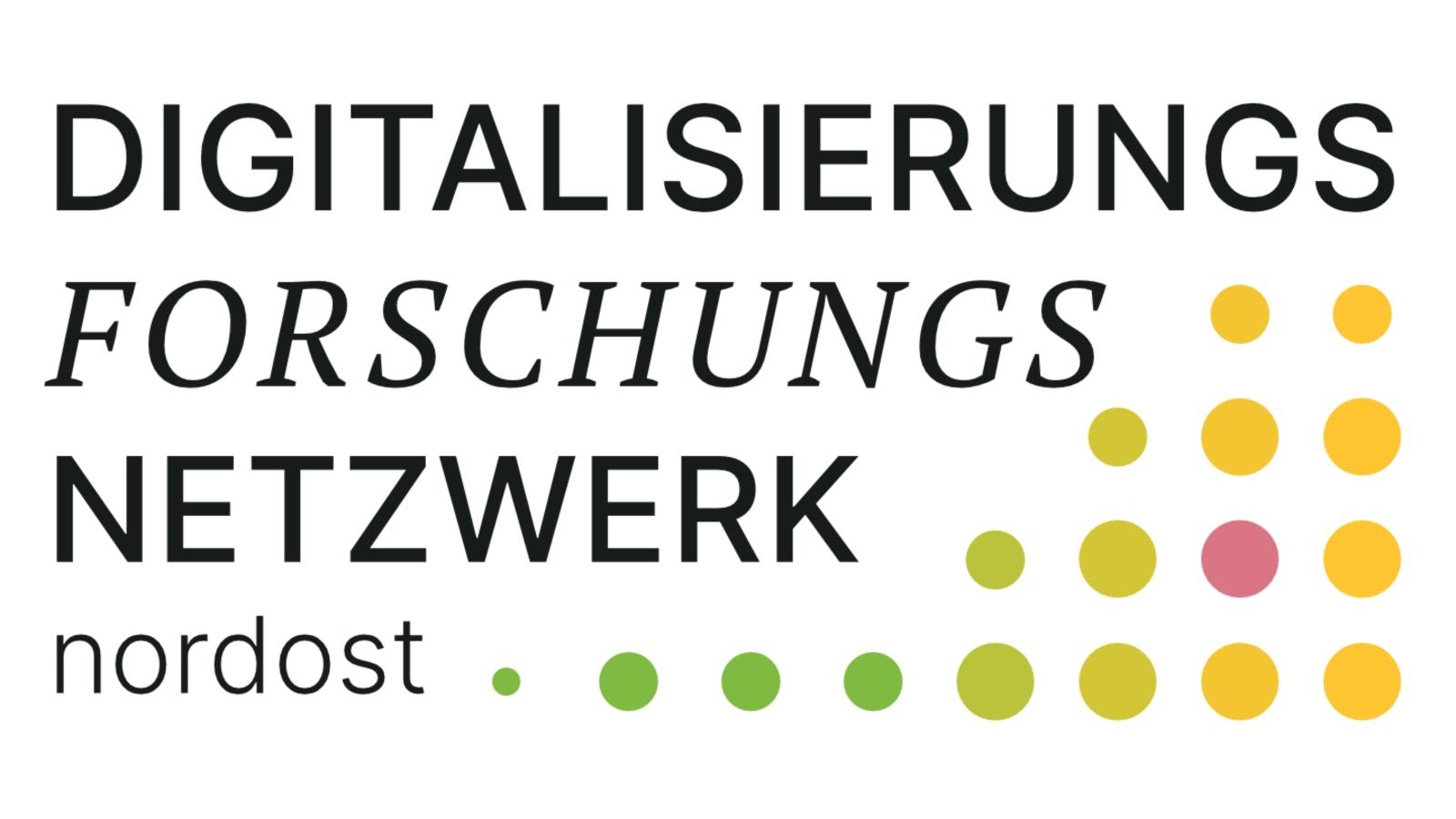
#GesellschaftBilden in the Digital Age. Perspectives of Social Work on Technological Challenges
The project establishes a cross-university network on digitalisation in social work as a subject of cooperative research and teaching.

Communicative Appropriation of Digital Sports
An explorative analysis of chat communication in eSports using the example of the Paris Major Blast 2023
SocialGestures – Gestures as Cultural Markers: The Importance of Tact Gestures for Social Preference and Learning in Childhoos and Early Childhood in France and Germany
SocialGestures is a joint research project of the University of Applied Sciences Potsdam and the Université Grenoble Alpes. The project was developed jointly and is being carried out under joint responsibility. It is funded by the German Research Foundation (GR 4756/3-1).
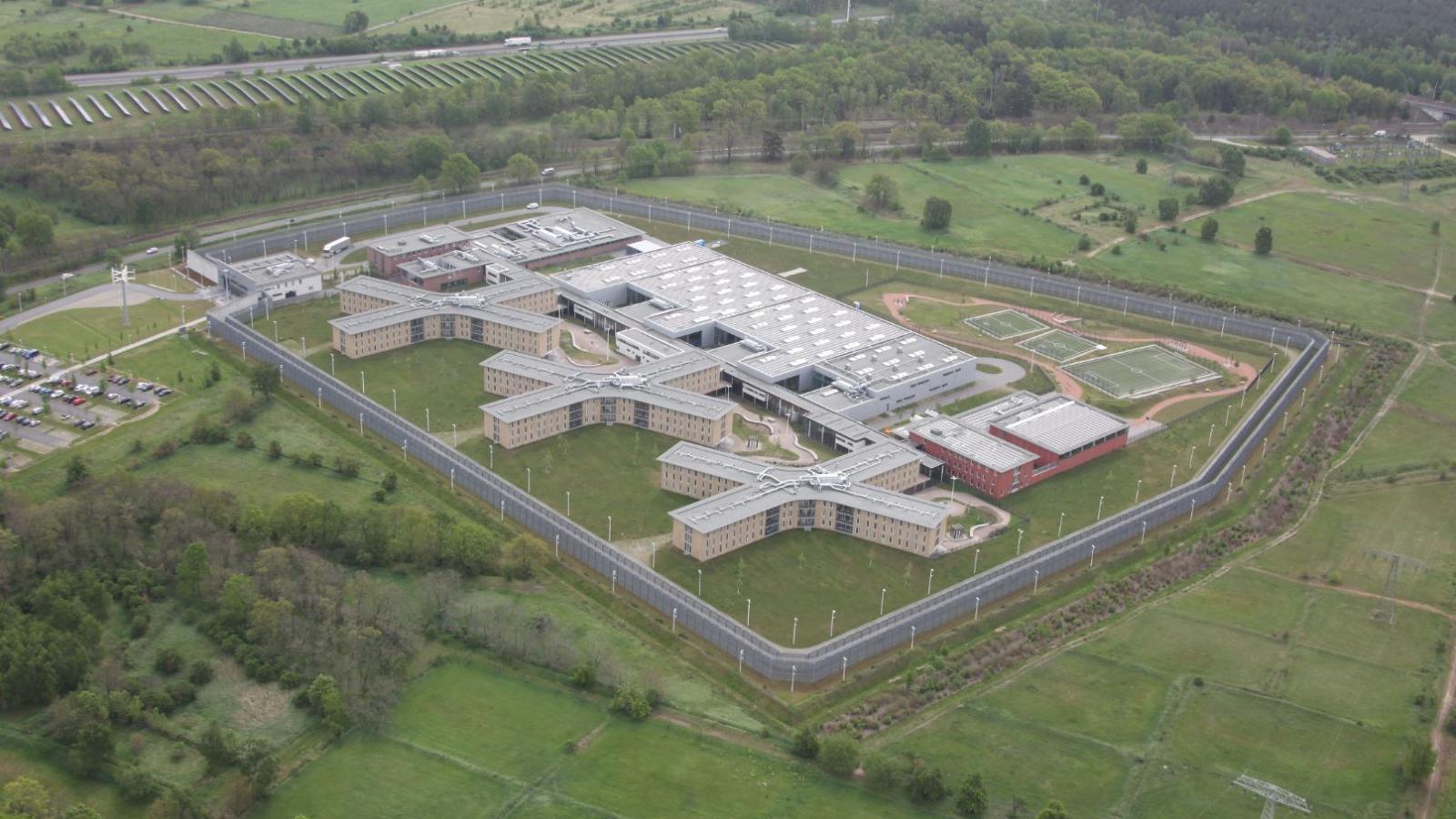
Prison Architecture – Use of Space and Everyday Experience in a Berlin Prison
The research interest of the ethnographic study concerns the perception of prison architecture as well as the practices of space use and space appropriation by prisoners and staff in a Berlin correctional facility.
Application & Contact
Dates & requirements for your application
The most important deadlines, dates and admission requirements for the bachelor's degree programme in social work are compiled here. You can find out which steps you need to take for a successful application in the next section.
Dates
- 5th of June: Info day for Social Work, Early Childhood Studies and Social Work (BASA online)
- by 15 July: register and submit an online application
- by 15 July: apply for a higher semester to continue a degree programme you have started at the University of Applied Sciences Potsdam
Access requirements
- General university entrance qualification according to the Brandenburg university act: General university entrance qualification or entrance qualification for studies at universities of applied sciences or previous vocational training recognised as equivalent
This is how you apply!
In the following, we explain to you which aspects you should pay attention to from the registration for the central allocation of study places to the matriculation (enrolment).
Further information
The following links provide you, and especially international applicants, with further information on the topics of application and enrolment at the University of Applied Sciences Potsdam.

International applicants
You would like to apply for studies from the first or a higher semester and have acquired your school-leaving qualification and/or university degree abroad? Then you can have degrees and achievements acquired abroad recognised and study with us.

Application & Enrolment Procedure
The application and study service provides information and advice on general questions regarding the application process, admission and enrolment at the University of Applied Sciences Potsdam, application for a higher semester, but also on topics such as compensation for disadvantages, part-time studies, waiting semesters and hardship applications.
Application & Enrolment University of Applied Sciences Potsdam
Contact & Services
The student counselling service provides information and advice on general questions about studying as well as on topics such as choosing a degree programme, application, enrolment and study organisation.
For subject-specific questions on module content, credit transfer, examinations or specialisations in the social work degree programme, the subject counselling service is the right place to go.
Subject Counselling Service

Dipl.-Soz.Arb. Dipl.-Soz.päd. Matthias Schreckenbach, M. A.
Study and Examination Service
Study Info Service
studien-info-service@fh-potsdam.de
bewerbungs-service@fh-potsdam.de
campuskarte@fh-potsdam.de
Study Service
studien-service@fh-potsdam.de
Exam Service
pruefungs-service@fh-potsdam.de
Family Affairs Commissioner
Office hours
Tue and Thu 9.30 am – 1.30 pm
Commissioner for University Employees with Impairment
Office hours
by arrangement
Contact Persons Department of Student Affairs
